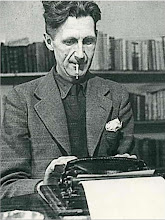
[Portrait of Don Knuth by Alexandra Drofina.]
Email is a wonderful thing for people whose role in life is to be on top of things. But not for me; my role is to be on the bottom of things. What I do takes long hours of studying and uninterruptible concentration.
An admirable insight. But what's truly remarkable is the degree to which Knuth has followed through on that insight: he doesn't use email.

I have been a happy man ever since January 1, 1990, when I no longer had an email address. I'd used email since about 1975, and it seems to me that 15 years of email is plenty for one lifetime.
Before you go thinking that Don Knuth is some sort of reactionary, neo-nostalgist Luddite [I'll be ranting on that last term in a future post], you should know that I'm talking about Professor Don Knuth of Stanford University, one of the most esteemed computer scientists in the world. There's no Nobel Prize for his discipline, but if there were, Knuth would likely be a multiple laureate. Let's put it this way: American Scientist ranks his 1968 edition of The Art of Computer Programming as one of the twelve most important monographs of the twentieth century, putting him alongside Einstein, Feynman, Pauling and Mandelbrot.
Knuth's work is pretty much a foundation point for contemporary programmers. The software I'm using to write this--and the software you're using to read it--was almost certainly written by someone who sweated their way through his Fundamental Algorithms, or Sorting and Searching. Nor is he resting on his laurels: Combinational Algorithms, the next volume of his The Art of Computer Programming, is eagerly awaited (and massive enough that "volume" doesn't really describe it: it will probably comprise at least three separate "subvolumes").
So he's not exactly afraid of technology. But to get work done on that order of magnitude, he's taken necessary measures to reclaim a maximum of time and focus. "I need to communicate with thousands of people all over the world as I write my books," he acknowledges on his website. "I also want to be responsive to the people who read those books and have questions or comments. My goal is to do this communication efficiently, in batch mode --- like, one day every three months." Which means you might as well communicate with him by mail or fax; he cheerfully provides both address and fax number.
Professor Knuth isn't anti-email. He's just chosen to live his life on terms that don't require the urgency (either real or imagined) of the medium. To be strictly honest, he does have an email address, or rather his office does; it's useful for file transfers and the like. And on the rare occasions where time is really of the essence, he doesn't mind sending email through an intermediary, but only "with respect to the project I'm currently working on, when I believe that the recipient won't be bothered by my request."
Not everyone can follow Knuth's example to a full degree, of course; some of us are required to use email more frequently, if only because our idiosyncrasies aren't indulged quite so much as those of a distinguished professor. But the Knuth approach to datastream management--not interrupting himself any more than necessary--is something anyone can adopt. What, exactly, is the necessary amount of time you need to spend online? Can you spend that time in "batch processing" mode, rather than making it a continuous folded-in distraction?
If you don't want to think about your online life in terms of "necessary" and "unnecessary", then be aware you're making a choice. And your best work--the kind of writing you really, really want to do--is probably on the other side of that choice. You can stay on top of things, or you can really get to the bottom of them.



3 comments:
I thoroughly enjoyed the read. And he's right, email just kills any sort of continuity of thought.
I use it at work and it does interrupt every thing I do, as I have somehow been trained to immediately read everything that makes its home in my inbox.
What a terrific post. I think the professor is making a choice that increasingly people are going to defect to, as the pace of communication speeds up to an untenable degree (if it is not already there).
Very well said!
E-mail was new to me in school- in 1996+ and I remember writing and receiving a lot of personal correspondence that resembled letters (with greetings and closures).
It seems the novelty wore off, as e-mail and intra-nets became workplace vehicles. Those invasive missives came to represent either demands, bad news, or inconsequential proclamations. The personal touch disappeared (has it gone to Facebook?).
But, alas, e-mail is a necessary tool of just about every workplace.
When it comes to writing tools, and time, I try to take as much as I can on my own terms. About 10 years ago, I eliminated TV from my life. Radio suits me fine, and I can write while listening!
Post a Comment